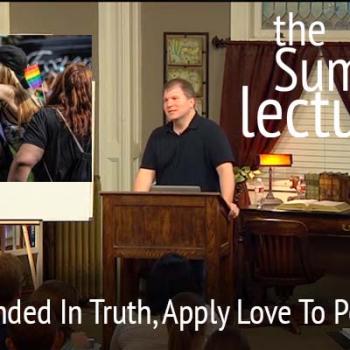Angels and The Holy Books In Islam
To purchase the entire Summit Lecture Series, Vol. 2 on DVD, visit summit.org.
Abdu Murray:
The next fundamental belief is in what are called angels and jinn. Islam has a very complicated angelology. They have a very large system of what angels do and what they don’t do. Angels are beings that are created from pure light, and they are incapable of free will. They simply do God’s will. They’re pure beings who just do God’s will. That’s all they do. There’s archangels like the Archangel Gabriel. The Archangel Gabriel is the Messenger. He comes to all the prophets, and he speaks the words of God to profits like Mohammed. So they are created from pure light, and they cannot disobey God.
But then there’s another set of creatures called jinn. We get our word genie from this. Jinn actually predate Islam. It was an Arab belief in the idea of these very poltergeistery-kind of mischievous spirit creatures who were created from a smokeless fire. And they have the ability to obey God or disobey God just like us, but they’re very powerful spiritual beings. And most of them are mischievous. And most of them plan the ruin of mankind. They sort of hate humanity. In fact, in the Quran, there’s the story, Satan is actually a jinn, not an angel. It’s a bit of a debate about that, but Satan in Orthodox Islam is a jinn, and he hates that man was created, because God says pay homage and bow down to humanity, as I’ve created him. And Satan’s like, “No, I’m better than him. You created me from a smokeless fire. You created him from clay. Why should I bow down to him?”
And so he was cast out of God’s presence, and thereafter sought to ensnare mankind and bring them away from God. It’s somewhat similar to our story about the Fallen Angel, of course, but Islam shares it a little bit different. So there’s angels and there’s jinn. Then there’s the profits. Islam believes in a large number of profits. Muslims claim Islam teaches that there are 124,000 profits sent to the people of mankind. Everyone in the world got a prophet who, whether they’re in India, China, South America, it doesn’t matter where they were. They got a prophet who told them to worship the one God and submit to his will, and don’t follow other gods, 124,000. The Quran and Islam do not mention the 124,000 by name, just a few by name. Some may surprise you. Here are the profits that we actually thought… As a Muslim, I believed in, and I thought these are the prophets of God. These are the people who were special in God’s eyes: Adam, Noah, Abraham, Moses, Jesus, and Mohammad. Sort of the big six.
Islam recognizes other people who were special, like Ishmael, and Isaac, and Job, and Jonah, and Joseph. The Quran has all these, or snippets of these stories in it about these prophets. John the Baptist is mentioned as well. So you have this going on. Now, what a Muslim considers to be a prophet, like Adam’s a prophet in Islam. Now he’s not a profit in terms of having the office of a prophet in Christianity, but what a Muslim means by prophet is, someone who speaks directly with God, and then speaks to others about him, or at least speaks in a mediated sense, because God does not condescend to speak to humanity. So he always sends an archangel to be his messenger for him to humanity. So none of the profits actually spoke to God directly. They spoke for God through an angel. That’s what the profits are.
So these profits are pretty important. Now they believe in Jesus as a prophet, but they don’t believe him as anything more than that. He is a profit and that’s it. He’s not divine. The Son of God is not the Messiah, although the Quran calls him al-Masih. Al-Masih means the messiah, but what they mean by that is something totally different. In fact, there really isn’t a definitive meaning for what messiah actually means in Islam. He’s just called Isa, al-Masih, Jesus the Messiah. What that means? They don’t know. But they know that he’s called that in Christianity, so in order to gain Christian converts, I think, Islam actually recognized him as the Messiah. If you ask the Muslim, what does Messiah mean? They have no idea. He was a warner. He was a monotheist, according to Islam, who believed in Allah, and he foretold Mohammed’s coming, and he said, “No, I’m not God. And there is no Trinity.” And he didn’t die on the cross for our sins. He just told us how to get to Heaven by following God’s rules.
 Then there’s the holy books. Muslims believe that God’s revelation exists with him forever in a thing called the Mother of the Book or, Umm al-Kitab. The Mother of the Book is this heavenly tablet from which all the heavenly scriptures are derived. And they are sent down in time to humanity in successive revelations over time. Those books might surprise you. They include, for example, the Torah and the Psalms. Muslims believe that God sent down the Torah, which is called the Tawrat in Arabic, and the Zabūr were the Psalms of David. Those were sent down as divine revelation to various prophets, Moses being one, and of course, David being another.
Then there’s the holy books. Muslims believe that God’s revelation exists with him forever in a thing called the Mother of the Book or, Umm al-Kitab. The Mother of the Book is this heavenly tablet from which all the heavenly scriptures are derived. And they are sent down in time to humanity in successive revelations over time. Those books might surprise you. They include, for example, the Torah and the Psalms. Muslims believe that God sent down the Torah, which is called the Tawrat in Arabic, and the Zabūr were the Psalms of David. Those were sent down as divine revelation to various prophets, Moses being one, and of course, David being another.
The Gospel, the Quran specifically mentions a book by Jesus or from Jesus called the Injil, or the Gospel. Now this word Injil is not an Arabic word originally. It’s actually a Syriac word that borrows from a Greek word to become the Injil. You know the word for gospel in Greek is evangel or euangelion. Evangel, Injil, you can see the sort of etymology taking place there. Islam claims that Jesus had a book called the Gospel. Good news, the Injil, and it was revealed to mankind. It existed and it was brought about, and Jesus had it and he preached it, and his disciples preached it. But don’t get too excited about this in one sense, because Muslims not only believe that the Torah and the Zabur and the Injil came, but unfortunately they were corrupted by human beings, either intentionally or unintentionally to include these horrible blasphemies about God being triune, and Jesus being the Son of God who dies for the sins of the world.
So the Trinity is a blasphemy that crept into the text of the Old and New Testaments, and this is a corruption, and the incarnation of God in Christ is a corruption, a blasphemous corruption that crept into the text over time as people started to change it for their own ends. And the idea that God would die on a cross for sinful human beings, how in the world could that be? That must be a corruption that crept into the text. So these corruptions happened in the scriptures of the Jews and the Christians, but they were once God’s Word. But to fix that, the Quran came. To fix all that, God revealed the Quran, the final revelation of God, and that this would correct all those horrible corruptions.
Islam rejects every one of those ideas, Trinity, incarnation, atonement at the cross. Rejects every one of those ideas. And the Quran came to set the record straight. So the Quran has Jesus denying his divinity, denying the Trinity. The Quran says that Jesus wasn’t even crucified on a cross, but somebody else was made to look like him, and he was crucified instead. So that’s what the Quran does, and it brings us back to a system of monotheism, heavily rules-based. Just tons of rules in it. And then in order to supplement the Quran, because most of it’s not understandable. And I don’t mean that in a pejorative sense. I don’t mean that in an insulting sense. There’s a lot of vagueness in the Quran.
There’s a lot of rules, but some serious vagueness. In order to understand what the Quran even says, there’s a thing called the Hadith. The Hadith, it’s from the Arabic word which means conversation or events. The Hadith is a massive collection about Muhammad’s life and what he said in interpreting the Quran, and how a Muslim should conduct himself. Huge collections. There are six main collections of Hadith. The two most trusted are called al-Bukhari, B-U-K-H-A-R-I, and a one called abu-Muslim, M-U-S-L-I-M. And those collect some of the more reliable traditions about Muhammad. And remember what I said, the traditions weren’t written down until these men collected them, up to 200 years after Mohammed’s death.
So they were largely oral at this time. And a lot of them were inauthentic. A lot of them were spurious. A lot of them were sort of to be rejected, because they weren’t trustworthy, but these men collected the most trustworthy ones. The vast majority of Muslims today read the Quran as their primary authority. The Hadith is our secondary authority, and don’t even read the Torah, the Zabur, or the Injil at all, because they think it’s corrupted and you shouldn’t look at it.
Follow Christian Podcast Central on Facebook, Instagram and Twitter to see our ongoing discussion with Dr. Jeff Myers regarding worldviews.
(This podcast is by Summit Ministries. Discovered by Christian Podcast Central and our community — copyright is owned by the publisher, not Christian Podcast Central.)












